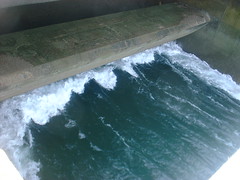 |
| Tidal Barrage (Photo credit: frachon) |
The controversial proposal to build a £30 billion barrage across the Severn Estuary has been criticised by LibDem mayoral candidate Jon Rogers, who has expressed concern over the scheme's impact on thousands of jobs at Avonmouth and Portbury docks.
Dr Rogers is quoted in South West Business as saying:
"A report was published in 2010 which said a barrage would cost too much for what it would gain and therefore everyone was far more relaxed about future investment in the port. But if it were to go ahead, then it could have a very negative impact on the port which I want to see protected."
 The Bristol City Councillor claims that alternative sources of clean energy to the barrage could include tidal fences, lagoons and tidal reefs - all smaller-scale schemes with less environmental impact. He also believes that local firms could develop and build these technologies, thus developing global influence leading to long-term exports.
The Bristol City Councillor claims that alternative sources of clean energy to the barrage could include tidal fences, lagoons and tidal reefs - all smaller-scale schemes with less environmental impact. He also believes that local firms could develop and build these technologies, thus developing global influence leading to long-term exports.
The Bristol Port Company directly employs about 600 staff, with about another 8,000 workers dependent on the port for their day-to-day living.
If you enjoyed this post, get free updates by email or RSS.



